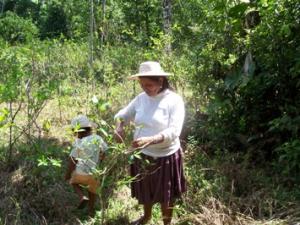Drug War Issues
Politics & Advocacy
The Bolivian government will buy up legally produced "excess" coca to prevent it from leaking into the cocaine trade, Vice Minister of Social Defense Felipe Caceres said last week. The government will use funds from the treasury to make the purchases, Caceres said in remarks reported by the Bolivian newspaper La Razon.

Cultivating coca in the Chapare. (photo by the author)
A government study of licit coca consumption, which would provide the basis for estimating the size of the licit coca crop, is set for release in September, but Caceres said the study will estimate the area of licit cultivation at about 16,000 hectares.
For political reasons -- to keep President Evo Morales' power base among Chapare coca growers happy -- the government will allow the excess production up to 20,000 hectares and just buy it up.
"We will buy all that coca so that it is not diverted to the drug trade, to become raw material for drugs, with resources from the general treasury of the nation," Caceres said. Cultivation above 20,000 hectares would be manually eradicated, he added.
Bolivia is the world's third largest coca producer -- behind Peru and Colombia -- and some significant portion of that crop is destined to become cocaine smoked in the favelas of Brazil or snorted in the drawing rooms of Europe. While actively combating the cocaine traffic, the Morales government is determined to support traditional coca consumption and cultivation as part of Bolivia's national heritage.
Earlier this year, Bolivia withdrew -- at least temporarily -- from the United Nations 1961 Single Convention on Narcotic Drugs because of its inclusion of the plant in its list of proscribed substances. Coca is not a drug, it's a plant, Bolivia maintains. The government indicated when announcing its withdrawal from the treaty that it would rejoin in a year, signing on to all the treaty provisions except the proscription on coca.
This work by StoptheDrugWar.org is licensed under Creative Commons Attribution-ShareAlike 4.0 International
Add new comment